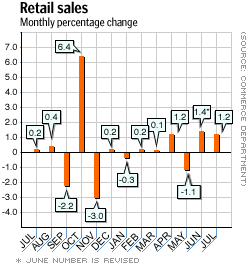NEW YORK (CNN/Money) -
Retail sales rose in the United States in July, the government said Tuesday, though most of the gain was due to robust automobile sales, driven by dealer incentives.
The data seemed unlikely to change dramatically the views of the economy held by Federal Reserve policy makers meeting Tuesday in Washington and participants at President Bush's economic forum, scheduled to begin at 10:00 a.m. ET in Waco, Texas.
The Commerce Department said retail sales rose 1.2 percent last month to $304.3 billion after a revised 1.4 percent gain in June. Excluding volatile automobile sales, retail sales rose 0.2 percent, compared with a revised gain of 0.5 percent in June.

Economists, on average, expected sales to rise 1.2 percent and "core" sales to rise 0.3 percent, according to Briefing.com.
"These numbers are essentially telling us that retail sales were artificially boosted by zero-percent financing," said Anthony Chan, chief economist at Banc One Investment Advisors. "These numbers are not going to do anything to discourage the Fed from thinking that the balance of risk in the economy is toward weakness."
The news comes on a day when Fed policy makers meet to discuss their target for short-term interest rates. They are widely expected to leave rates alone, keeping their target at a 40-year low -- though some on Wall Street, shaken by a recent drop in stock prices and fears about the ability of corporations and consumers to get credit and spend money, want a rate cut.
There is still a possibility that, as Chan suggested, they could adjust the language of the statement accompanying their decision to say that they see risks of weakness in the economy. Since March, the Fed's view has been balanced between a risk of weakness and a risk of inflation.
| |
 Related stories
Related stories
| |
| | |
| | |
|
Also Tuesday, President Bush and members of his cabinet will participate in a forum to discuss problems with the economy and how to solve them -- though most observers doubt little new policy will come out of the three-hour meeting.
Both groups pay close attention to consumer spending, since it makes up about two-thirds of the $10 trillion total economy. Strong consumer spending helped the economy weather a recession that began in March 2001
In the Commerce Department report, automobile and auto-parts sales rose a whopping 4.2 percent, matching June's gain. Automakers have used zero-percent financing and other incentives to lure buyers -- and buyers have responded, a healthy sign that, while consumers are cautious about spending, they're still willing to buy if the price is right.
"If people are willing to buy big-ticket items, the message they are sending is that they still have confidence about the future," said Joel Naroff, president and chief economist at Naroff Economic Advisors in Holland, Pa.
Also contributing to the headline sales figure were higher gasoline prices, which drove sales at gas stations up 2.7 percent after June's 0.1 percent drop.
Still, sales of furniture fell 1.4 percent after falling 1.1 percent in June, while sales of electronics and appliances fell 1.0 percent after rising 1.1 percent in June.
"You had big components down that should not be down, such as appliances, furniture and building materials," said Lara Rhame, an economist and bond market strategist at Brown Brothers Harriman. "These should be stronger given the robust housing market."

|

